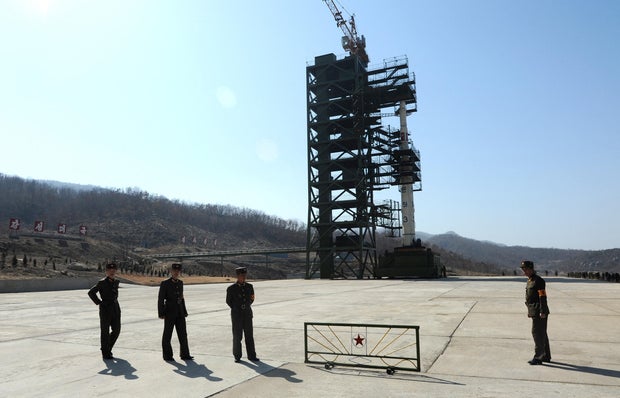Seoul, South Korea — North Korea announced plans to launch a rocket apparently carrying its second military spy satellite during an eight-day period starting Monday, drawing quick, strong rebukes from neighbors South Korea and Japan.
The notification of the planned launch, banned under U.N. resolutions, came as South Korean President Yoon Suk Yeol and Japanese Prime Minister Fumio Kishida met Chinese Premier Li Qiang in Seoul for their first trilateral meeting in more than four years.
Japan’s coast guard said it was notified by North Korea about its planned launch of a “satellite rocket,” with a warning of caution in the waters between the Korean Peninsula and China and east of the main Philippine island of Luzon beginning Monday through midnight June 3.
North Korea provides Japan with its launch information because Japan’s coast guard coordinates and distributes maritime safety information in East Asia.
North Korea’s planned launch is thought to be an attempt to put its second military spy satellite into orbit. South Korea’s military said Friday it detected signs of suspected preparations to launch a spy satellite at North Korea’s main Tongchangri launch facility in the northwest.
The U.N. bans North Korea from conducting any satellite launches, viewing them as covers for testing long-range missile technology. North Korea has steadfastly maintained it has the right to launch satellites and test missiles. It says spy satellites will enable it to better monitor the U.S. and South Korea’s moves and enhance the precision strike capability of its nuclear-capable missiles.
“Any launch (by North Korea) using ballistic missile technology would directly violate U.N. Security Council resolutions and undermine peace and security of the region and the world,” Yoon said at the start of the meeting with Kishida and Li. “If North Korea presses ahead with its launch despite the international warning, I think the international community must sternly deal with it.”
Kishida said he strongly urges North Korea to cancel the launch. China is a North Korean ally, and Li didn’t mention the North Korean satellite.
In phone talks earlier Monday, senior diplomats from Japan, South Korea and the United States agreed to call on North Korea to abandon the launch. South Korea’s Unification Ministry, which deals with North Korea, separately called a satellite launch by the North “a provocation that seriously threatens our and regional security.”
Later Monday, South Korea mobilized 20 fighter jets for a drill meant to demonstrate its resolve to punish North Korea in the event of provocation, according to South Korea’s military. Japanese officials said their missile interceptors remain ready to shoot down any debris from a North Korean rocket if it falls on Japanese territory.
Last November, North Korea sent its first military reconnaissance satellite into orbit as part of efforts to build a space-based surveillance network to cope with what it calls increasing U.S.-led military threats. North Korean leader Kim Jong Un later told a governing party meeting that the country would launch three additional military spy satellites in 2024.
Whether the North Korean satellites can produce militarily meaningful imagery is widely doubted, but some civilian experts say operating several satellites could help North Korea continuously monitor big enemy targets.
The latest launch notification to Japan identifies the same danger zones for potential rocket debris as those identified prior to North Korea’s last launch. That suggests North Korea would use the same first and second rocket stages as before, said Chang Young-keun, a missile expert at the Seoul-based Korea Research Institute for National Strategy.
Chang said launching three satellites this year would enable North Korea to obtain imagery on sites in South Korea, Japan and the U.S. Pacific territory of Guam more frequently.
Since 2022, North Korea has been engaged in a provocative run of missile tests to modernize and expand its weapons arsenal, prompting the U.S., South Korea and Japan to strengthen their security partnership in response. Experts say North Korea likely believes an enlarged weapons arsenal would increase its leverage in future diplomacy with the U.S.


